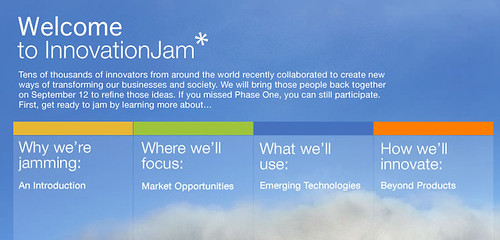IBM's chief executive, Sam Palmisano, is set to launch a $100 million investment to incubate new businesses--and he will make the announcement in both the physical and virtual worlds.
In the article, under the header "Where IBM is placing bets", some project ideas were mentioned:
He said that the ideas that seem likely to produce something solid in the next year or so are: "Intelligent Utility Networks," which looks into ways to do real-time monitoring and control of power transmission grids; "Real-time Translation Services"; and "Simplified Business Engines," a proposal to package Web 2.0 services up with IBM blade servers.
Medium-term projects are "Smart Healthcare Payment Systems," which use smart cards to process medical claims; and "Integrated Mass Transit Information Systems," a way to get real-time data for mass transit systems.
Longer-term projects are "Electronic Health Records" and "Big Green Innovations." In the second case, IBM intends to seek out emerging environmental opportunities, such as using nanotechnology for water filtration.
Other ideas include "Branchless Banking for the Masses," "3D Internet," and a simplified online storage service dubbed "Digital Me."
Interesting. I'm thinking "If those ideas become reality, what does it mean for libraries in general?"
I suppose there aren't any real answers to that, because "what it means to libraries" depend on how the ideas are manifested. Still, I can already visualise how some ideas could turn out.
The "Digital Me" idea is the most intriguing of all, at least for me. I can imagine myself carrying a device -- like how I wear a watch or carry a mobile phone or PDA -- and using that device to upload/ download/ share digital objects or files on the fly. Except that the storage space would not be on to the physical device but online. Implied is that access bandwidths are also vastly improved, and cheap enough that everyone can afford it.
Hmm... if such an idea does become reality, the question wouldn't be "what does it mean for libraries" but rather "what does it mean for society"... ...
OK, what I was really picked up from the article was something called InnovationJam, an online brainstorming session that IBM organised (see www.globalinnovationjam.com/get_started2006/index.shtml)

Under "Where we'll focus: Market Opportunities", there are four sub-sections:
- Going Places
- Finance & Commerce
- Staying Healthy
- A Better Planet
Another section I found really interesting was "Emerging Technologies", where they had these sub-sections:
- Embedded Intelligence
- Extracting Insight
- Global Collaboration for Individuals
- Global Collaboration for Companies
- Practical Supercomputing
- Intelligent IT Systems
I'm not sure how many of you read Hard Science Fiction. If you do, I bet the above ideas aren't exactly revolutionary or radical. But you can't deny that while the concepts and ideas aren't reality yet, the fact is that they have spilled over from the pages of fiction to the business realm. That has to mean something.
To read what others are blogging about InnovationJam, click on this Technorati Tag: innovationjam
Related Technorati Tags: futurewatch, future society

Interesting crystal ball gazing at our tech-enabled future. I feel that people may increasingly gravitate towards "life simplifying" technology. In other words, how to get rid of all the clutter, information overload and incessant chatter that is ringing all over the place. People's attention spans will also increasingly diminish, while multi-tasking will become the order of the day.
ReplyDeleteMy own theory is that the relentless march of technology may lead not only to the miniaturisation of devices, but also the miniaturisation of information served in bite-sized crumbs as opposed to main courses.